Arts
Roop Inka Mastana

Shaan is on a roll
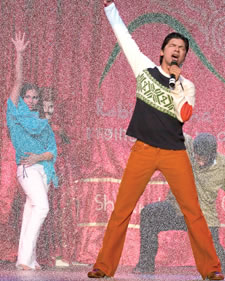 His father, Manas Mukherjee, was a well respected music composer who gave music for stellar movies like Shayad and Albert Pinto ko gussa kyon aata hai, but struggled in Bombay till his untimely death. For son Shantanu, or Shaan as he is popularly known, the musical journey however turned into a stairway to superstardom. His voice has a velvety quality and a sound that fits most heroes on the screen. Hosting the blockbuster musical show Saregamapa has catapulted him into a household name nationally and internationally. His father, Manas Mukherjee, was a well respected music composer who gave music for stellar movies like Shayad and Albert Pinto ko gussa kyon aata hai, but struggled in Bombay till his untimely death. For son Shantanu, or Shaan as he is popularly known, the musical journey however turned into a stairway to superstardom. His voice has a velvety quality and a sound that fits most heroes on the screen. Hosting the blockbuster musical show Saregamapa has catapulted him into a household name nationally and internationally.
The song “Shuruat” in his new sizzling album Tishnagi was made into a music video to promote the film, The Chronicles of Narnia: The Lion, The Witch and The Wardrobe. In an exclusive interview with Little India’s Kavita Chhibber, the incredibly charming, down-to-earth singer, composer and popular TV host, talks about his musical journey and why his wife Radhika and he steer clear of the glitter of Bollywood. Your father’s journey was obviously different from yours. What are the early memories? Dad started in Calcutta and after doing very well there decided to come to Bombay to try his luck in the industry. He initially wanted to make it as a singer, but then turned to composing, which he excelled at. Work was limited at that time, especially for an outsider. My father had been well known for the excellence of his work and had also been assisting music maestro Salil Chaudhry. Still he could not find work easily, in spite of the fact that Salil Chaudhry was a big name in Bombay and dad had already sung for him in Bengali. My father learnt the hard way that there is no transitional period for an outsider. The understanding and knowledge of music that my father had was simply way beyond what I knew and know to this day about music.
I am completely self- taught. I think what really worked for me was that we were brought up in Bandra where the Catholic culture was predominant. The music that I heard was all English rock and top of the pops. I think it was really after high school that I rediscovered Hindi music. I was dazzled by R.D. Burman and ghazals. Once I got my dose of Mehdi Hassan, Ghulam Ali and Jagjit Singh, there was no looking back. I was hooked. Still my music is not from one source, but a mix of several influences. I was actually just bumming around doing odd jobs when the Indi-pop scene started heating up. I was singing with some other people and my sister was doing the same thing. One day my sister said let’s make an album together. We signed up with Magnasound recording company and made Q-Funk, but it was Roop Inka Mastana, a remix album of R.D. Burman’s songs that brought us into the limelight. I think people started thinking of us in the same way they looked at Zoheb and Nazia Hassan. Ofcourse all this while we were clueless and weren’t sure if Indi-pop was the way to go. But suddenly, with Made in India, Indi-pop became the mainstream music everyone was beginning to love, so we ended up being in the right place at the right time. I’m sure your first solo album Loveology is dear to you for sentimental reasons, but it was Tanha Dil, that really catapulted you to the next level. It revived the listeners faith in Indi-pop, after the kind of trashy albums that were being churned out. Ram Sampath and you were a great team, but you are not working together any more. There were three years between Loveology and Tanha Dil. Both were albums that hreflected two different phases of my life. Lovelogy brings back memories of my college days and experiences related to those times. We were kids from middle class families, riding buses and couldn’t even afford to buy a cup of coffee for ourselves, leave alone ask a girl out for coffee. There would also be those rich guys on motorbikes that would get the girls and look, oh so cool. Loveology was my way of saying that if you have true love in your heart, you can over come all these materialistic hurdles. Tanha Dil was from those days when all my friends were looking at making a living and many had gone or decided to go abroad and I was trying to look at the dilemma faced by someone who has to leave his homeland and go away to make a living. I couldn’t say tera desh pukhare wapas aa, yahan bhi roti milti hai (your country calls you come back … you will find your livelihood here too), because it was not true. They were leaving because they couldn’t find that livelihood here.
By the time Tanha Dil was created, Ram really made me introspect about what it was that we really should be doing. We spent a lot of quality time making Tanha Dil and its success gave me a lot of credibility. I would have loved to make more albums with Ram, but there were several factors that came in the way. First, we became very busy individually. My very first film song Musu Musu became a big hit, and I felt that since Tanha Dil was one album where some of the lyrics written by me were the key to the success of the album, I should have some creative control in the next album, which Ram would not agree to. I would love to work with him again. He is incredibly talented and creative. How has the music scene evolved over the years? There just seem to be so many recording companies and CDs being churned out. Today unfortunately it’s all about marketing and business. If you are really lucky you will find a company that works with you and stays away from telling you what kind of music to make. Most of the time, unfortunately, the only thing they are concerned about is whether the album will do well with the masses and what the video of the songs will look like. It takes away the entire creative process for the artist who then scrambles around to cater to the whims of these companies, compromising his music as a result. There are huge productions, like Adnan Sami does, with movie actresses in his videos, because he has the clout now. Mostly however, the budget for private albums is pretty limited.
People write on the run. There are only a handful of musicians who do justice to music. One of the hot and happening music directors Himesh Reshmaiya said that the music directors of today are more talented than those of yesteryears because unlike them, they don’t have quality lyricists and a great support system to work with. Who are the music directors you like? It is a good observation, but at the same time there is no justification for substandard or mediocre music. At the end of the day, no matter what the support system was with those people, they had the knowledge, the dedication, the creativity and a certain amount of spirituality to come up with the kind of incomparable songs they created – songs that have transcended generations and remain evergreen.
I can honestly say that I compose music by instinct, but I don’t have much knowledge of ragas. I also won’t be able to give you too many names when it comes to music directors of today who have the kind of knowledge music directors of yesteryears had. May be Ravindra Jain. That is it. Jatin-Lalit come from a classical music heritage, being nephews of Pandit Jasraj. While they don’t do raga-based songs all the time, I think they are the only musicians today who have the capacity to do what R.D. Burman did – achieve a timeless quality in their songs. A.R. Rahman on the other hand is very focused on ragas and also thinks out of the box. Rahman has broken away from tradition in the sense that his second stanza many be entirely different from the first one and he can use multiple singers, where each one will have his own chord. Rahman has a very active, very creative imagination. When he is composing, he isn’t thinking song, he is thinking soundtrack. The greatest survivor in the film industry is Anu Malik. He has survived there for three decades. He is also one of the most underrated music directors. When you meet him you will always find him brimming with energy, always enthusiastic, always surrounded by people. He will be talking to you and doing a hundred other things and then suddenly in the midst of it all, he’ll say okay let’s get to work and come up with the most incredible tunes in a jiffy, out of nowhere. Your voice has improved by leaps and bounds and you have been giving one hit after another in movies. Why do you think you’ve succeeded? I have always focused on versatility. On one side I can belt out a blockbuster like “Nikamma” and on the other hand I can sing the soulful rag-darbari based “Paigham laya saawan” and not many people can do that. I have started learning music again from the legendary Ghulam Mustafa Khan, and he has enriched my voice and taught me so much about life. Let’s talk about Saregamapa, which has made you a household name nationally and internationally. All the little NRI kids at the Raina Foundation charity even where you performed knew who you were and we saw a mix of diverse age groups and ethnicity among the audience. Even the American security guards were dancing as you sang. It has been an amazing experience and has of course done wonders in terns of visibility. I must say my Hindi has improved greatly thanks to the show. It has been a humbling experience to see such incredible talent from round one and I feel so grateful that I have been fortunate enough to reach where I have. I guess luck too plays a very important part. You have a very close relationship with your wife Radhika and your mom and sister. In an industry where marriages fall on the wayside like a deck of card what keeps you both close. I meet enough people while I’m working, but it’s really good to come home to someone who you know will keep you grounded. We’ve known each other a long time. I find it very strange when I see even the wives or girlfriends of celebrities sucking up to them and telling them what they want to hear and not what is the truth. We keep away from Bollywood parties and spend every spare time I have together with the family. I feel that material success and fame are very temporary things. It is very easy for me to see, if I look around, that there are many others who are more talented than me. I was just fortunate enough to reach where I reached and I accept that with all humility and gratitude. |

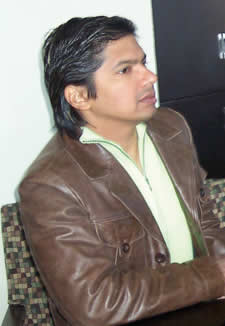 I was born in Bombay and so I began my life as an insider, unlike my dad. Also things have really opened up for singers from outside Bombay. You can see that in Saregamapa and Indian Idol where we have representation from many states of India. I was never asked to become a musician or really taught music as such, but growing in an environment so rich in music, makes its imprint in your psyche, and since it was also in my genes, I guess I must have had some natural musical talent.
I was born in Bombay and so I began my life as an insider, unlike my dad. Also things have really opened up for singers from outside Bombay. You can see that in Saregamapa and Indian Idol where we have representation from many states of India. I was never asked to become a musician or really taught music as such, but growing in an environment so rich in music, makes its imprint in your psyche, and since it was also in my genes, I guess I must have had some natural musical talent. 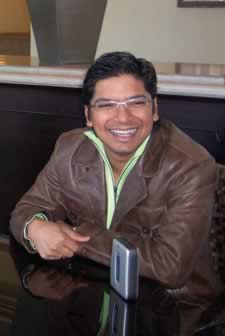 Then I did Aksar to show where I was at that point in my life. Today after being married and being a father of two, I can’t do a Loveology. I need to act my age. Aksar was more introspective and about relationships, and dedicated to my wife Radhika. Her presence in my life has changed me so much for the better. We did have a time crunch, and I also took a tour to promote the album and it was great to get a first hand response
Then I did Aksar to show where I was at that point in my life. Today after being married and being a father of two, I can’t do a Loveology. I need to act my age. Aksar was more introspective and about relationships, and dedicated to my wife Radhika. Her presence in my life has changed me so much for the better. We did have a time crunch, and I also took a tour to promote the album and it was great to get a first hand response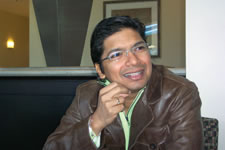 I have often been asked: “Why don’t you make film albums instead? They sell so well.” But I do that with the movie directors and sing as they want me to sing. For my personal growth and to explore my own creativity, I prefer to do a private album, which will have a message and deal with issues that concern us all. I also keep away from all outside musical influences and try to compose my own lyrics and music. My album must be unique and different from anything else that will be out there.
I have often been asked: “Why don’t you make film albums instead? They sell so well.” But I do that with the movie directors and sing as they want me to sing. For my personal growth and to explore my own creativity, I prefer to do a private album, which will have a message and deal with issues that concern us all. I also keep away from all outside musical influences and try to compose my own lyrics and music. My album must be unique and different from anything else that will be out there.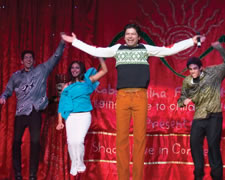 The worst part about today’s music is the lack of time. People are just looking at deadlines first and everything else is worked around it. Raj Kapoor took days to record one song. Himesh probably churns out a song every four hours! However Himesh is a very smart musician. He hrefuses to work with big banners, saying that if the movie is a hit the credit will go to the banner. He churns out hits for small films. The movies come and go, but his music sizzles and every one knows who it is by.
The worst part about today’s music is the lack of time. People are just looking at deadlines first and everything else is worked around it. Raj Kapoor took days to record one song. Himesh probably churns out a song every four hours! However Himesh is a very smart musician. He hrefuses to work with big banners, saying that if the movie is a hit the credit will go to the banner. He churns out hits for small films. The movies come and go, but his music sizzles and every one knows who it is by.
You must be logged in to post a comment Login